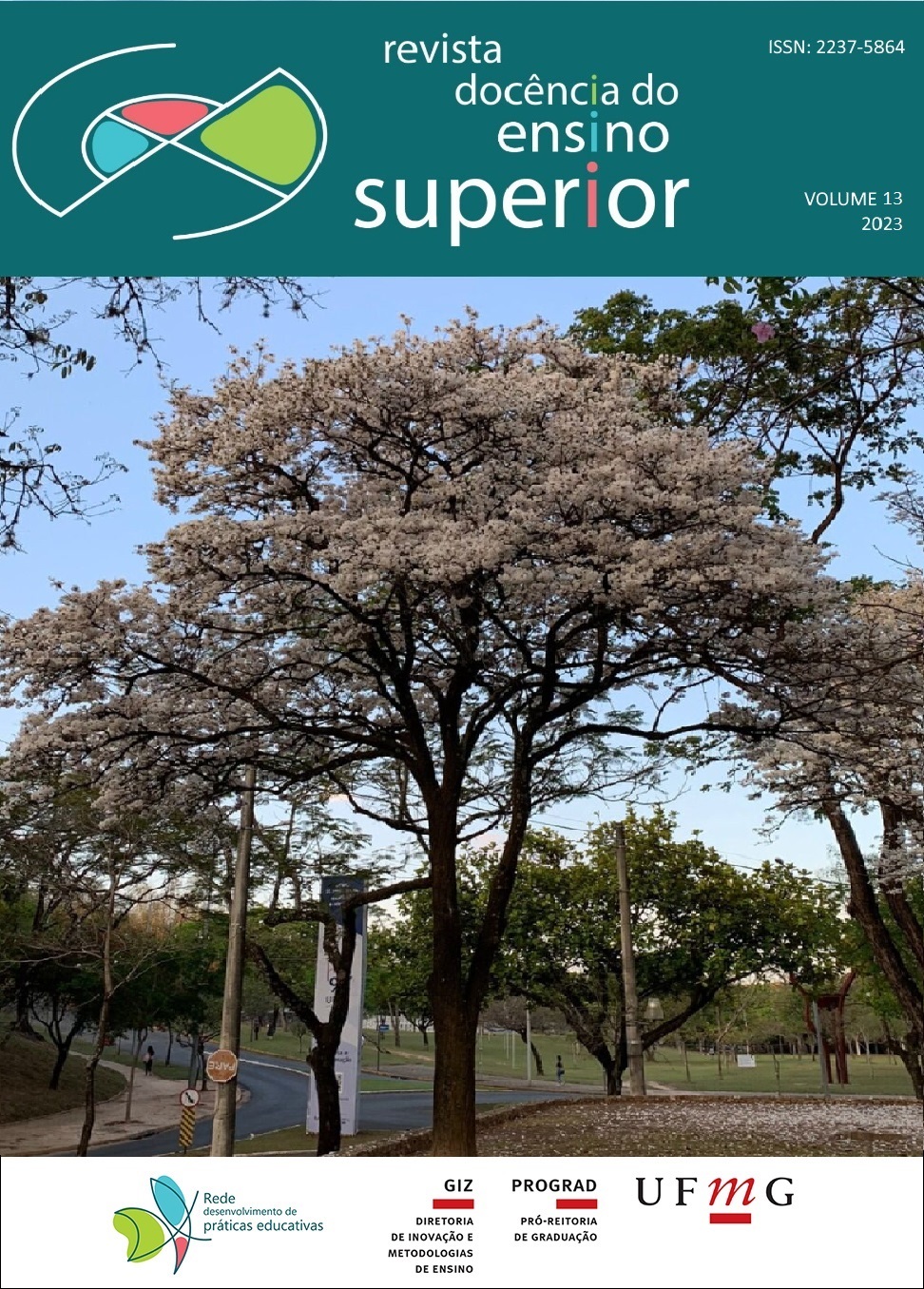Emergency remote education during covid-19 pandemic
a public university Nutrition course evaluation
DOI:
https://doi.org/10.35699/2237-5864.2023.34838Keywords:
distance education, higher education, covid-19, educational measurementAbstract
The objective of the research was to evaluate the emergency remote teaching implemented in an undergraduate course in Nutrition at Federal University of Minas Gerais. For this, research was carried out through electronic forms applied to students, teachers and educational managers, in two moments, within six months, and the data were analyzed of statistical methods. Satisfaction with remote learning, perception of learning and effective communication showed a significant decline among all actors involved in the process. There was an increase in the number of total enrollment cancellations, in addition to the non-offer of in-person practices considered essential, which will need to be offered and redefined later. The main barriers for remote study by the student were not centered on the lack of equipment and internet access, but on family issues, inadequate study conditions, lack of time and non-adaptation to the new teaching regime.
Downloads
References
AKOUR, Amal et al. The impact of the covid-19 pandemic and emergency distance teaching on the psychological status of university teachers: a cross-sectional study in Jordan. The American Journal of Tropical Medicine and Hygiene, Arlington, v. 103, n. 6, p. 2391-2399, dez. 2020. DOI: https://dx.doi.org/10.4269%2Fajtmh.20-0877. Disponível em: https://www.ncbi.nlm.nih.gov/pmc/articles/PMC7695050/. Acesso em: 10 dez. 2021.
BARDIN, Laurence. Análise de conteúdo. São Paulo: Edições 70, 2011. 280 p.
BASTOS, Milena de Carvalho et al. Ensino remoto emergencial na graduação em Enfermagem: relato de experiência na covid-19. Revista Mineira de Enfermagem, Belo Horizonte, v. 24, e-1335, ago. 2020. Disponível em: https://cdn.publisher.gn1.link/reme.org.br/pdf/e_1335.pdf. Acesso em: 27 mar. 2023.
CASTIONI, Remi et al. Universidades federais na pandemia da covid-19: acesso discente à internet e ensino remoto emergencial. Ensaio: Avaliação e Políticas Públicas em Educação [online], Rio de Janeiro, v. 29, n. 111, p. 399-419, abr./jun. 2021. DOI: https://doi.org/10.1590/S0104-40362021002903108 Disponível em: https://www.scielo.br/j/ensaio/a/53yPKgh7jK4sT8FGsYGn7cg/?lang=pt. Acesso em: 10 dez. 2021.
CNS. Conselho Nacional de Saúde. Resolução nº 510, de 07 de abril de 2016. Disponível em: http://conselho.saude.gov.br/resolucoes/2016/Reso510.pdf. Acesso em: 27 mar. 2023.
GUERRA-BÁEZ, Sandra Patrícia. Una revisión panorámica al entrenamiento de las habilidades blandas em estudiantes universitarios. Psicologia Escolar e Educacional, Uberlândia, v. 23, e186464, 2019. DOI: https://doi.org/10.1590/2175-35392019016464 Disponível em: https://www.scielo.br/j/pee/a/YyZgKBY9JLVXnCDKMNc7nqc/?lang=es. Acesso em: 10 dez. 2021.
LISCHER, Suzanne; SAFI, Netkey; DICKSON, Cheryl. Remote learning and students’ mental health during the covid-19 pandemic: a mixed-method enquiry. Prospects, p. 1-11, 2021. DOI: https://dx.doi.org/10.1007%2Fs11125-020-09530-w. Disponível em: https://link.springer.com/article/10.1007/s11125-020-09530-w. Acesso em: 8 fev. 2023.
MATOS, Daniel Abud Seabra; JARDILINO, José Rubens Lima. Os conceitos de concepção, percepção, representação e crença no campo educacional: similaridades, diferenças e implicações para a pesquisa. Educação & Formação, Fortaleza, v. 1, n. 3, p. 20-31, set./dez. 2016. DOI: https://doi.org/10.25053/edufor.v1i3.1893. Disponível em: https://revistas.uece.br/index.php/redufor/article/view/111/94. Acesso em: 10 dez. 2021.
OLIVEIRA, Luciana; MESQUITA, Anabela; SEQUEIRA, Arminda; OLIVEIRA, Adriana. Emergency remote learning during covid-19: socio-educational impacts on portuguese students. In: Auer M. E., Rüütmann T. (ed.) Educating engineers for future industrial revolutions. ICL 2020. Advances in Intelligent Systems and Computing, v. 1328, mar. 2021. Disponível em: Disponível em: https://link.springer.com/chapter/10.1007%2F978-3-030-68198-2_28. Acesso em: 10 dez. 2021.
SHIM, Tae Eun; LEE, Song Yi. College students’ experience of emergency remote teaching due to covid-19. Children and youth services review, New York, v. 199, p. 105578, dez. 2020. DOI: https://doi.org/10.1016/j.childyouth.2020.105578. Disponível em: https://www.ncbi.nlm.nih.gov/pmc/articles/PMC7550861/. Acesso em: 10 dez. 2021.
SILVA, Beatriz Xavier Ferreira da; CAROLINA NETO, Victória; GRITTI, Neusa Haruka Sezaki. Soft skills: rumo ao sucesso no mundo profissional. Revista Interface Tecnológica, Taquaritinga, v. 17, n. 1, p. 829-842, 2020. . Disponível em: https://revista.fatectq.edu.br/index.php/interfacetecnologica/article/view/797. Acesso em: 10 dez. 2021.
SINDIANI, Amer Mahmoud et al. Distance education during the covid-19 outbreak: a cross-sectional study among medical students in North of Jordan. Annals of Medicine and surgery, London, v. 59, p. 186-194, nov. 2020. DOI: https://doi.org/10.1016/j.amsu.2020.09.036. Disponível em: https://www.sciencedirect.com/science/article/pii/S2049080120303411?via%3Dihub. Acesso em: 10 dez. 2021.
UFMG. Universidade Federal de Minas Gerais. Portaria UFMG nº 1819, de 18 de março de 2020a. Disponível em: https://ufmg.br/storage/9/d/5/b/9d5bff9213dc34c2ed1763bb4c4143ea_15845832990431_378828222.pdf. Acesso em: 27 mar. 2023.
UFMG. Universidade Federal de Minas Gerais. Guia: diretrizes para o ensino remoto emergencial. 2020b. Disponível em: https://www.ufmg.br/prograd/wp-content/uploads/2022/01/DiretrizesERE.pdf. Acesso em: 27 mar. 2023.
UFMG. Universidade Federal de Minas Gerais. Resolução CEPE/UFMG nº 02, de 9 de julho de 2020c. Disponível em: https://www2.ufmg.br/sods/content/download/2461/16548/version/2/file/02rescepe2020.pdf. Acesso em: 27 mar. 2023.
Downloads
Published
How to Cite
Issue
Section
License
Copyright (c) 2023 Tamires Nunes dos Santos, Daniele Cristina de Almeida, Yaske Palhares Fonseca, Milene Cristine Pessoa, Rita de Cássia Ribeiro

This work is licensed under a Creative Commons Attribution 4.0 International License.
Authors who publish in this journal retain the copyright and grant the journal the right of first publication, with the work simultaneously licensed under the Creative Commons Attribution License which allows the sharing of work with acknowledgment of authorship and initial publication in this journal.
Authors are authorized to take additional contracts separately, for non-exclusive distribution of the version of the work published in this journal (e.g. publish in institutional repository or as a book chapter), with acknowledgment of authorship and initial publication in this journal.
Open access policy:
Revista Docência do Ensino Superior is an Open Access journal, which means that all content is available free of charge, at no cost to the user or their institution. Users may read, download, copy, distribute, print, search, or link to the full texts of the articles, or use them for any other legal purpose, without seeking prior permission from the publisher or author, provided they respect the license to use the Creative Commons used by the journal. This definition of open access is in line with the Budapest Open Access Initiative (BOAI).
























